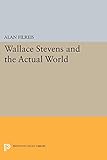Wallace Stevens and the Actual World / Alan Filreis.
Material type: TextSeries: Princeton Legacy Library ; 1156Publisher: Princeton, NJ : Princeton University Press, [2014]Copyright date: ©1991Edition: Course BookDescription: 1 online resource (390 p.)Content type:
TextSeries: Princeton Legacy Library ; 1156Publisher: Princeton, NJ : Princeton University Press, [2014]Copyright date: ©1991Edition: Course BookDescription: 1 online resource (390 p.)Content type: - 9780691603766
- 9781400861705
- History, Modern, in literature
- Political poetry, American -- History and criticism
- Politics and literature -- United States -- History -- 20th century
- Reality in literature
- War poetry, American -- History and criticism
- World War, 1939-1945 -- Literature and the war
- LITERARY CRITICISM / American / General
- 811/.52 20
- PS3537.T4753 -- Z636 1991eb
- online - DeGruyter
- Issued also in print.
| Item type | Current library | Call number | URL | Status | Notes | Barcode | |
|---|---|---|---|---|---|---|---|
 eBook
eBook
|
Biblioteca "Angelicum" Pont. Univ. S.Tommaso d'Aquino Nuvola online | online - DeGruyter (Browse shelf(Opens below)) | Online access | Not for loan (Accesso limitato) | Accesso per gli utenti autorizzati / Access for authorized users | (dgr)9781400861705 |
Frontmatter -- Contents -- List of Illustrations -- Abbreviations and Cue Titles -- Preface -- Acknowledgments -- PART ONE: STEVENS'S NATIONAL MOMENT -- Chapter 1. Playing Checkers under the Maginot Line -- Chapter 2. Formalists under Fire -- PART TWO: STEVENS AT THE END OF IDEOLOGY -- Chapter 3. Description without a Sense of Place -- Chapter 4. Cuba Should Be Full of Cuban Things -- Chapter 5. The Postcard Imagination -- Chapter 6. Last American Occasions -- Notes -- Index
restricted access online access with authorization star
http://purl.org/coar/access_right/c_16ec
The work of Wallace Stevens has been read most widely as poetry concerned with poetry, and not with the world in which it was created; deemed utterly singular, it seems to resist being read as the record of a life and times. In this critical biography Alan Filreis presents a detailed challenge to this exceptionalist view as he traces two major periods of Stevens's career from 1939 to 1955, the war years and the postwar years. Portraying Stevens as someone whose alternation between cultural comprehension and ignorance was itself characteristically American, Filreis examines the poet's impulse to disguise and compress the very fact of his debt to the actual world. By actual world Stevens meant historical conditions, often in order to impugn his own interest in such externalities as the last resort of a man whose famous interiority made him feel desperately irrelevant. In light of events ranging from the U.S. entry into World War II to the Cold War, Filreis shows how Stevens was driven to make a "close approach to reality" in an effort to reconcile his poetic language with a cultural language. "Wallace Stevens and the Actual World is not only an impressive feat of historical recovery and analysis, but also a pleasure to read. It will be useful to anyone interested in the relationship between American politics and literature during World War II and the Cold War."--Milton J. Bates, Marquette UniversityOriginally published in 1991.The Princeton Legacy Library uses the latest print-on-demand technology to again make available previously out-of-print books from the distinguished backlist of Princeton University Press. These editions preserve the original texts of these important books while presenting them in durable paperback and hardcover editions. The goal of the Princeton Legacy Library is to vastly increase access to the rich scholarly heritage found in the thousands of books published by Princeton University Press since its founding in 1905.
Issued also in print.
Mode of access: Internet via World Wide Web.
In English.
Description based on online resource; title from PDF title page (publisher's Web site, viewed 30. Aug 2021)


